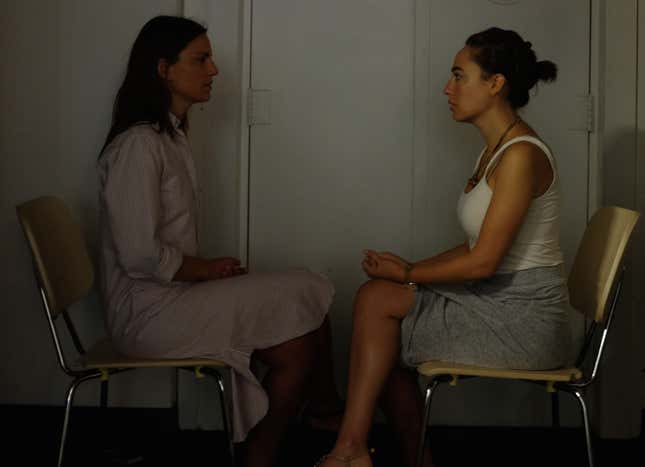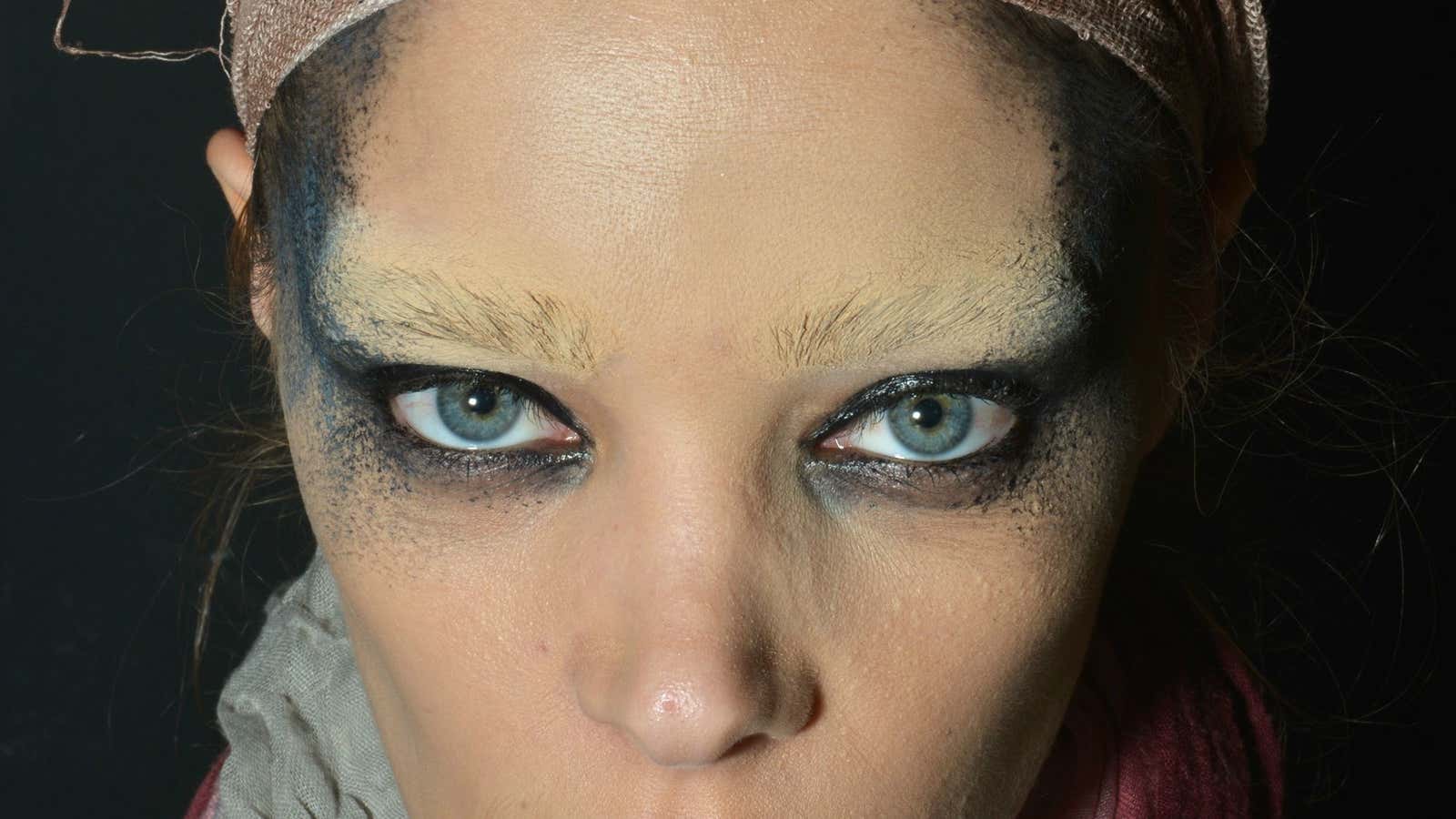I just took a brief hallucination break with a colleague. We stepped into a supply closet, dimmed the lights, sat down, and watched one another’s faces morph into those of lionesses. I cried the whole time. Then we went back to work.
We were testing out a theory, reported in IFL Science, that staring into someone’s eyes for ten minutes can have LSD-like hallucinogenic effects, and found that, whoa: Indeed it can.
Giovanni Caputo, a researcher at the University of Urbino in Italy, paired up 20 people, had them stare into one another’s eyes in a dimly lit room for ten minutes, and reported on the results in Psychiatry Research. Caputo’s subjects reported some pretty strange effects, including out-of-body experiences and seeing monsters or dead people.
So when my co-worker Lauren Brown arrived this morning, I asked her: “Can I look into your eyes for ten minutes?”
“I thought you’d never ask,” she laughed.
I set about approximating the conditions of Caputo’s study, which was a bit like creating a make-out room for a game of “Seven Minutes in Heaven,” only in my workplace.
I dragged two chairs into a large closet and with a small desk lamp behind some boxes as the only source of light, made the room dim enough that I couldn’t perceive color, but was still able to discern details a few feet away from me. I put my phone on airplane mode and brought in Lauren. We sat down and set the timer.

Lauren has a fairly intense gaze that’s symmetrically framed by striking, full eyebrows. The moment we sat down in the dark, that was the first thing that struck me, and then the giggles, which she got too. After a few long seconds, we settled into our places. I watched the smile fade from Lauren’s face, and felt sucked into her eyes. The bottom of her face started to elongate, and the highlights on her cheeks started to look like some kind of war paint or tribal markings. It occurred to me that she looked like a Native American chieftain.
Then my phone fell off the camera bag it was sitting on, and smacked onto the floor. I broke our stare to pick it up and restart the timer. It had been about 30 seconds. We started again.
Now we settled more quickly, and again I felt totally sucked into Lauren’s eyes, and very calm. I’m not much of a meditator—my earnest attempt with Headspace was rather short-lived—but I quickly fell into what I would call a meditative state. Thoughts floated in and out of my brain, but I felt like I was observing them, more than actively thinking them, like: Oh, that’s interesting. Now I’m wondering whether Lauren engages in facial contouring. Her cheekbones look so bright.
Very early on, my left eye started to water. A tear filled it up and rolled down my cheek. I brushed it away, and then worried that may have distracted Lauren. Then another one came, and I just let it roll all the way down to my neck. Then my right eye started too. Was I forgetting to blink? I was blinking, but the tears didn’t stop. They didn’t feel like emotional tears, but more like the ones that stream down my face on windy winter days.
But then, wait a minute. Was Lauren crying? It looked like her eyes were welling up, and it seemed like the corners of her mouth turned down. I felt there was a lot of emotion behind her eyes, and I just kept staring into them. Lauren has survived breast cancer, and it occurred to me that this could be a space where intense thoughts could creep in.
A few minutes later, she giggled.
Lauren’s chieftain face never came back, but her nose and mouth started to disappear, and were soon replaced with the muzzle of a large cat, like a mountain lion. (Seriously.) The whites of her eyes looked bright in the darkness, still framed by her eyebrows.
The timer went off.
“That went really fast,” I said.
“That went so fast!” she agreed.
We turned on the lights and stayed in the closet for a debriefing.
“That was really fucking weird,” I said. She agreed. I asked if she noticed my eyes watering the whole time. She hadn’t. I told her I didn’t feel emotional at all, but the tears just wouldn’t stop. It made me think of the Marina Abramovic performance piece, The Artist is Present, in which many of participants cried when faced with the silent, sitting Abramovic.
I told Lauren it looked like she was welling up a couple of times. She said she wasn’t at all. ”I think you were projecting,” she said.
Then she told me why she laughed halfway through our sitting. ”You started to look like a weird little animal!” she said.
“YOU started to look like an animal!” I shrieked. “A lion!”
“You were a lion!” she yelled. “A lioness,” she corrected herself.
We continued our very scientific analysis this way (unlike the subjects of Caputo’s study, who answered questions on a five-point scale, presumably not shrieking in a closet).
Lauren also said my face faded into a black silhouette, surrounded by blue light—and that at one point, it occurred to her that my face, in the dark, looked like death. I tried not to take this personally. ”But not like you were dead,” she said.
We emerged from the closet, and I looked at Caputo’s study in detail. Other subjects, it turned out, had reported seeing animals (30%) or the face of someone of a differing race (7%). A striking 75% said they saw the face of a monster. No one reported projecting emotions onto their staring partner, but that may be because Caputo didn’t ask.
Still, Lauren and my experience was probably more than a little different from those who participated in Caputo’s study—and not just because we were in a supply closet. We sat down as friends and colleagues who are comfortable with one another, not strangers. It made me think of The New York Times story (paywall) about falling in love with a stranger by answering personal questions while gazing into their eyes.
I wouldn’t say Lauren and I fell in love, but we did share something quite cool: A perception-shifting experience; a quiet space to sit with our thoughts, away from the internet; and a lot of laughs afterward. What’s more, it only took ten minutes, it was free, and we have no hangover to show for it.
I highly recommend finding a friend and a dark room, and taking ten minutes to try this out. Who knows what could happen?




